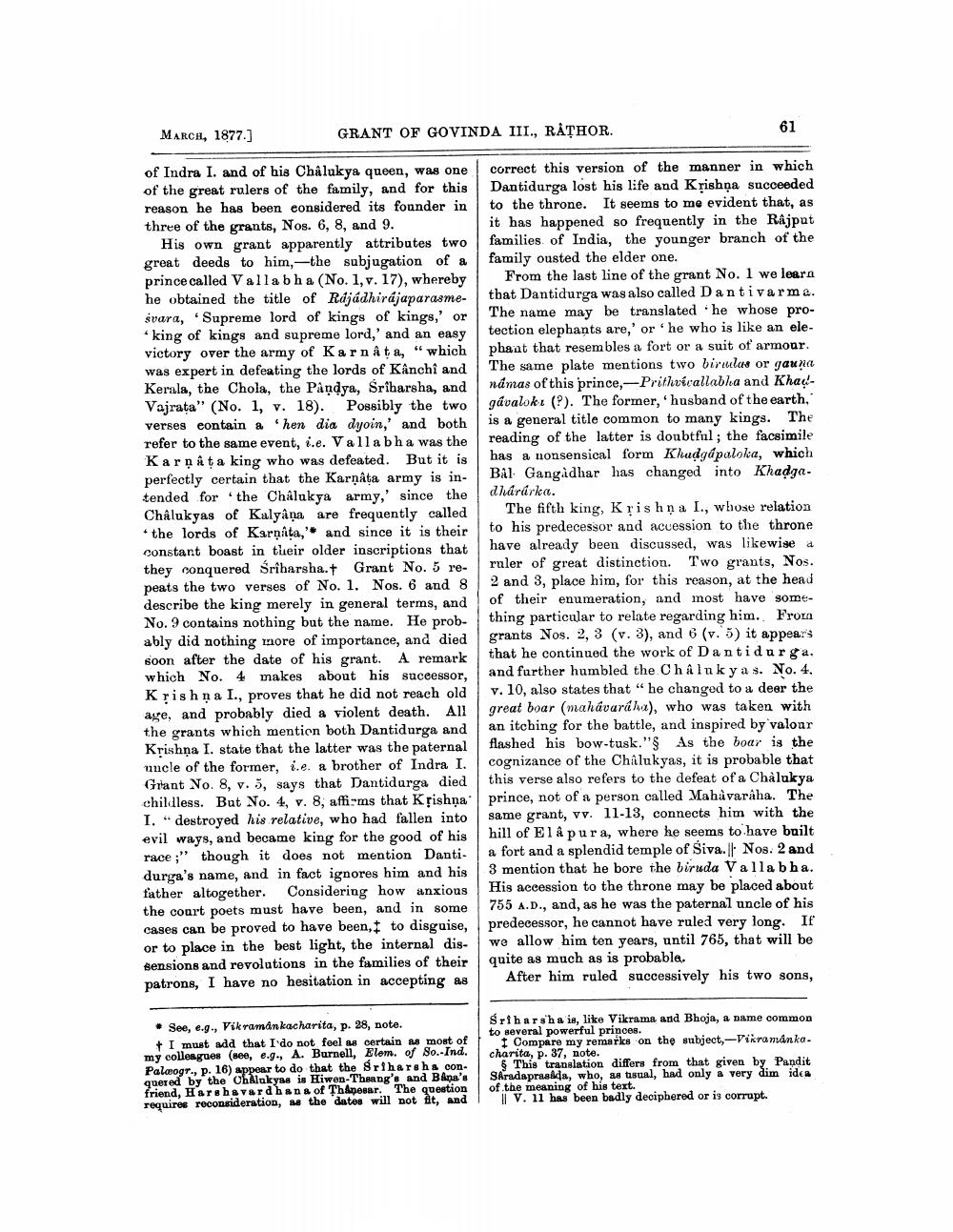________________
MARCH, 1877.]
GRANT OF GOVINDA III., RÅTHOR.
of Indra I. and of his Chalukya queen, was one correct this version of the manner in which of the great rulers of the family, and for this Dantidurga lost his life and Krishṇa succeeded reason he has been eonsidered its founder into the throne. It seems to me evident that, as three of the grants, Nos. 6, 8, and 9.
it has happened so frequently in the Rajput His own grant apparently attributes two families of India, the younger branch of the great deeds to him,--the subjugation of a family ousted the elder one. prince called Vallabha (No. 1, v. 17), whereby
From the last line of the grant No. 1 we leara he obtained the title of Rajadhirdjaparasme- that Dantidurga was also called Dantivarme. svara, "Supreme lord of kings of kings,' or The name may be translated he whose pro*king of kings and supreme lord,' and an easy tection elephants are,' or he who is like an elevictory over the army of Karnata, “which phant that resembles a fort or a suit of armour. was expert in defeating the lords of Kanchi and The same plate mentions two birmlus or gauna Kerala, the Chola, the Pandya, Sriharsha, and namas of this prince,-Prithricallabla and Khan Vajrata" (No. 1, v. 18). Possibly the two gávalok: (P). The former, husband of the earth, verses eontain a 'hen dia dyoin,' and both is a general title common to many kings. The refer to the same event, i.e. Vallabha was the reading of the latter is doubtful; the facsimile Karn å ta king who was defeated. But it is has a nonsensical form Khudgápaloka, which perfectly certain that the Karnata army is in- Bal Gangadhar has changed into Khadga. tended for the Chalukya army,' since the
dharárka. Chalukyas of Kalyaņa are frequently called
The fifth king, Krishna I., whose relation the lords of Karnata,' and since it is their to his predecessor and accession to the throne constant boast in their older inscriptions that have already been discussed, was likewise a they conquered Srîharsha.t Grant No. 5 re- ruler of great distinction. Two grants, Nos. peats the two verses of No. 1. Nos. 6 and 8 2 and 3, place him, for this reason, at the head describe the king merely in general terms, and of their enumeration, and most have someNo. 9 contains nothing but the name. He prob- thing particular to relate regarding him. From ably did nothing more of importance, and died grants Nos. 2, 3 (v. 3), and 6 (v. 5) it appears soon after the date of his grant. A remark
that he continued the work of Dantidurga. which No. 4 makes about his successor,
and further humbled the Châlnk yas. No. 4. Krishna I., proves that he did not reach old v. 10, also states that he changed to a deer the age, and probably died a violent death. All great boar (mahåvardhu), who was taken with the grants which mention both Dantidurga and an itching for the battle, and inspired by valoar Krishna I. state that the latter was the paternal flashed his bow-tusk." As the boar is the uncle of the former, i.e. a brother of Indra I. cognizance of the Chalukyas, it is probable that Grant No. 8, v. 5, says that Dantidurga died this verse also refers to the defeat of a Chålukya childless. But No. 4, v. 8, affirms that Krishna prince, not of a person called Mahàvaráha. The I. "destroyed his relative, who had fallen into same grant, vv. 11-13, connects him with the
il ways, and became king for the good of his hill of El & pura, where he seems to have built race;" though it does not mention Danti- a fort and a splendid temple of Siva. || Nos. 2 and durga's name, and in fact ignores him and his 3 mention that he bore the biruda Vallabha. father altogether. Considering how anxious His accession to the throne may be placed about the court poets must have been, and in some 755 A.D., and, as he was the paternal uncle of his cases can be proved to have been to disguise, predecessor, he cannot have ruled very long. If or to place in the best light, the internal dis- we allow him ten years, until 765, that will be tensions and revolutions in the families of their quite as much as is probable. patrons, I have no hesitation in accepting as After him ruled successively his two sons,
• See, e.g., Vikramankacharita, p. 28, note.
+ I must add that I do not feel as certain as most of my colleagues (nee, e.g., A. Burnell, Elom. of So.-Ind. Palmogr., p. 16) appear to do that the Sriharsha conquered by the Chalukyas is Hiwen-Thang'e and Bana's friend, Harshavardhana of Th Anesar. The question requires reconsideration, se the dates will not it, and
Sriharsha is, like Vikrama and Bhoja, a name common to several powerful princes.
I Compare my remarks on the subject,--Viiramanka. charita, p. 37, note.
$ This translation differs from that given by Pandit Skradapraska, who, as tisual, had only a very dim idea of the meaning of his text.
I V. 11 has been badly deciphered or is corrupt.




